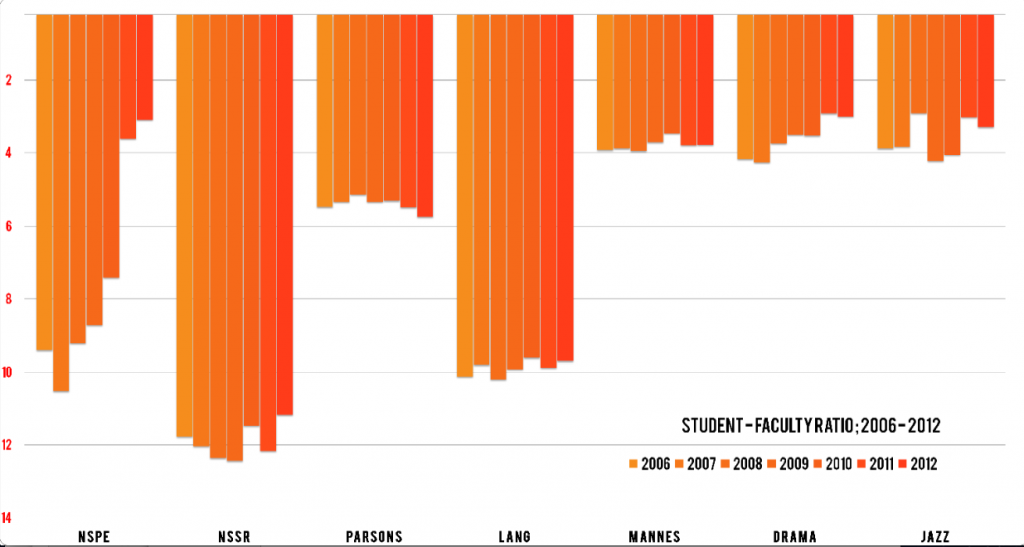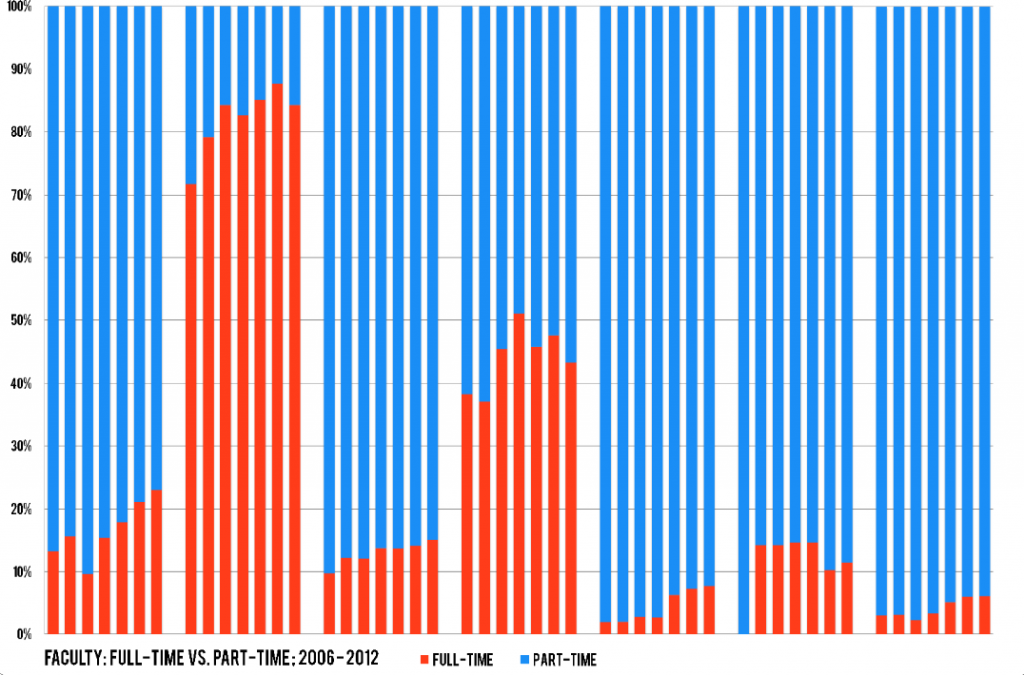The Economics Department’s Number Problem:
Will a Downturn in Faculty Threaten the Identity of the Department ?
The economics department of the New School for Social Research (NSSR) has steadily lost full-time faculty to retirement, leaves of absence and other universities, without replacing them with new tenured faculty. Concerns reached a climax after Edward Nell, a prominent senior professor, announced in November that he would not be returning next semester — leaving the department with only four full-time senior faculty members responsible for teaching and advising its 112 students.
The sixth loss in four years, Professor Nell’s departure raised questions about the future of the economics department’s reputation as a critical hub of mainstream economic thought. Nell, a noted authority in Post-Keynesian economics, a field in which the department prides itself on specializing, “wasn’t just a mainstay, some would say he’s the centerpiece of the ethos of this department,” said William Milberg, dean of NSSR.
“The ESU is determined to fight for the survival and reputation of our department,” the Economics Student Union wrote in a letter to President Van Zandt, Dean Milberg and Provost Tim Marshall. Citing a 25 to 1 student-faculty ratio, core required courses being replaced or taught by part-time professors and the loss of star faculty as creating a “state of emergency,” the letter urged that administrators hire two new tenured faculty members in time for the coming spring semester and three more by next year. “We believe the moment is upon us to reestablish our reputation as the school to address the most pressing economic issues in the 21st century, instead of letting the department decline into insignificance.”
For some students, the absence of faculty with expertise in the economics department’s distinctive specializations cast doubt on whether the division could hold its position as a leader in the field.
“I was expecting to receive the Post-Keynesian side of the story for my PhD dissertation and now I guess I might have to search for it outside NSSR, or not have it at all,” said Luis Daniel Torres Gonzalez, a first-semester doctoral student.
Core faculty like Professor Nell, a renowned authority in the area of Post-Keynesian economics, contributed immensely to the department’s distinction as a leader in its field of expertise. “The economics department has prided itself for many years on being very critical of mainstream economics and very critical of the political conflation of the idea of market economies with freedom and social optimality,” said Dean Milberg.
With Nell’s departure, students spoke out in alarm at the current state of crisis and its implications for their department’s ability to remain at the forefront of addressing the crucial economic issues in society today.
“Now is the time to act to protect this important bastion of critical, pluralist economic thought,” said Keith Harrington, a second year MA student. “As one of the last remaining heterodox economics departments in the country, it is imperative that the NSSR economics department should be ensured of a strong heterodox faculty for years to come.”
PhD student Enno Schröder put it bluntly: “The economics department needs four to five hires within the next two years. Otherwise I’d have trouble recommending prospective students to start their PhD here. There’s no shortage of demand, the administration just needs to create the corresponding supply.”
Similar scarcities have impacted other departments at NSSR. Earlier this semester, students in the politics department found themselves in a similar situation when the unexpected resignation of Professor Tarak Barkawi to take a position at the London School of Economics, which left the department with no tenured faculty specializing in Global Politics, one of the PhD program’s four concentrations.
The Union of Political Science Students circulated a petition in October decrying the faculty shortfalls that their classmates in economics later echoed.
“Without Tarak, or someone in line to replace him, it was hard to see how the Global Politics field could continue,” said Chris Harris, speaker of the Graduate Faculty-Student Senate. “This was troubling for many because they came to NSSR with that field in mind.”
Though the search for a replacement is in progress, students saw dark clouds for the future of their school in the lack of foresight by administration.
At a small school like NSSR, the loss of even a few professors can have an acute effect on advisement and research in specialized subjects. PhD students doing advanced research typically need three to four senior faculty on their dissertation committees. High student to faculty ratios can mean advisors are overburdened with more students and the quality of advisement can suffer.
On the national level, data collected by the National Center for Education Statistics suggests that, with the percentage of courses taught by part-time faculty on the rise, the amount of tenured positions available are on the decline compared to more precarious part-time, or “adjunct” positions. Compared with other divisions of The New School, NSSR’s ratio of full-time to part-time faculty is considerably high, correlating to the rigorous nature of PhD programs and the close collaboration between students and their advisors. Yet it also has the highest student-faculty ratio of any division at the university, putting a strain on the close relationship that graduate students desire.
While the economics department at NSSR was certainly in an unstable situation exacerbated by a confluence of unforeseen event, it was not indicative of the entire school. Student to faculty ratios were consistent around 11:1 across all departments at NSSR, except for economics, which was already at 19:1 before the departures of Professors Nell and Banerjee.
Dean Milberg empathized with the graduate students’ concerns and told the Free Press that faculty and administrators are currently taking steps to develop both short-term and long-term solutions.
After a two year hiring freeze, new tenured faculty are being hired in the politics, anthropology, psychology, sociology and economics. In the economics department specifically, they are looking to hire one full time professor to replace Edward Nell.
“I have really great faith that in the next year or certainly two, that we’ll be right back to full strength and maybe even stronger,” said Milberg.
Despite the strong concerns students voiced, there was hope and a positive outlook on shared goals.
“Though our situation is certainly dire, I do see steps being taken immediately in the right direction and I have a lot of hope for the future of our unique and important department,” said Alexandria Eisenbarth, a second year MS student. “I think the response of the faculty and the action of the students indicate how deeply we all care about the success of the department.”
With reporting by Danielle Balbi
These graphs were compiled using data from The New School’s Fact Book, 2006-2012.
Shawn is a native of Queens majoring in Politics at The New School. He joined The Free Press in Fall 2013, and covers student life, academic affairs and activism on campus, bringing a critical investigative approach to journalism through social media, institutional research, and data-driven fact finding.
Shawn's work has appeared in Adbusters, The Nation, PolicyMic, Truthout, The Brooklyn Indypendent, and the Italian news magazine, Internazionale. He is also a research and analyst for the government and corporate transparency project, LittleSis.
Shawn likes only five things: black coffee, unfiltered cigarettes, smoky whiskey, dark Belgian beer, and the news. He speaks five languages and loves to travel. Shawn shares a birthday, April 4th, with Grumpy Cat.










I must thank you for the efforts you have put in penning this website.
I really hope to check out the same high-grade content from you in the
future as well. In truth, your creative writing
abilities has inspired me to get my own, personal blog now 😉
It’s nearly impossible to find educated people for this subject, however,
you sound like you know what you’re talking about!
Thanks